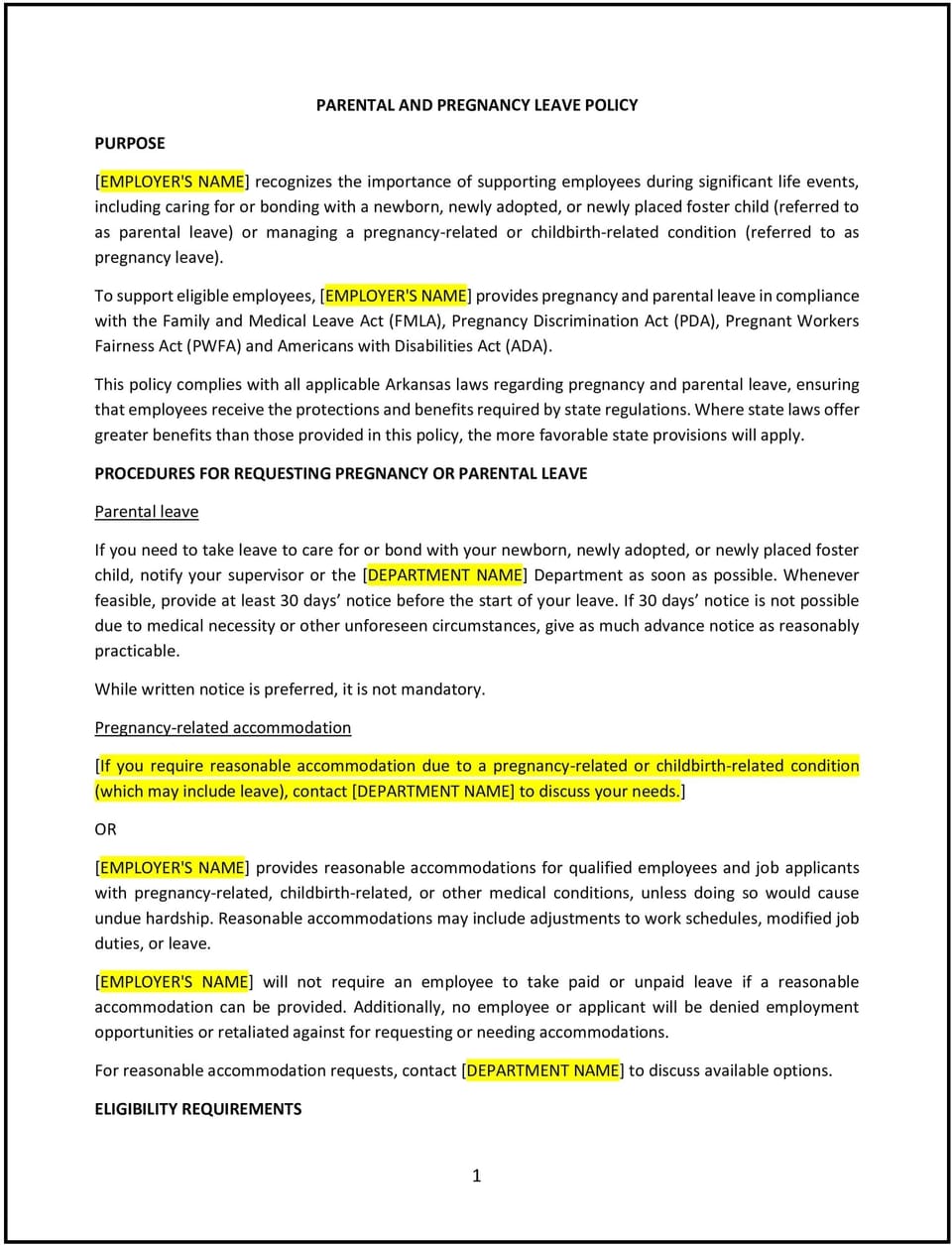Parental and pregnancy leave policy (Arkansas): Free template

Parental and pregnancy leave policy (Arkansas)
In Arkansas, a parental and pregnancy leave policy provides employees with clear guidelines for taking time off related to pregnancy, childbirth, or the care of a new child. This policy supports employees’ family needs while ensuring businesses comply with applicable federal laws, such as the Family and Medical Leave Act (FMLA), and any Arkansas-specific requirements.
This policy outlines eligibility, leave procedures, and job protection rights to ensure fairness and consistency. By implementing this policy, Arkansas businesses can support employees, foster workplace morale, and manage leave requests effectively.
How to use this parental and pregnancy leave policy (Arkansas)
- Define eligibility: Clearly specify who qualifies for parental or pregnancy leave, including requirements for tenure or hours worked.
- Outline leave types: Include details on paid and unpaid leave, FMLA-protected leave, and other leave options offered by the business.
- Establish leave request procedures: Provide a step-by-step process for employees to request leave, including notice requirements and necessary documentation.
- Communicate job protection: Ensure employees understand their rights to return to their previous or equivalent positions after leave, as mandated by law.
- Coordinate benefits: Clarify how benefits, such as health insurance, will be handled during the leave period.
Benefits of using this parental and pregnancy leave policy (Arkansas)
This policy offers several advantages for Arkansas businesses:
- Supports employee well-being: Provides employees with the flexibility to manage family and health needs, fostering trust and loyalty.
- Promotes workplace fairness: Establishes consistent guidelines for managing leave requests, ensuring equitable treatment of employees.
- Supports compliance: Aligns with FMLA requirements and any Arkansas-specific laws related to parental and pregnancy leave.
- Enhances employee retention: Demonstrates the business’s commitment to supporting employees, improving morale and reducing turnover.
- Streamlines processes: Simplifies the management of leave requests, ensuring consistency and efficiency.
Tips for using this parental and pregnancy leave policy (Arkansas)
- Address Arkansas-specific considerations: Reflect any state-level requirements or workforce practices relevant to parental and pregnancy leave.
- Provide training: Educate managers and HR personnel on handling leave requests to ensure compliance and fairness.
- Maintain clear communication: Regularly inform employees about their rights and the steps for requesting leave.
- Document thoroughly: Keep detailed records of leave requests and approvals to ensure transparency and compliance.
- Review periodically: Update the policy to reflect changes in laws, business practices, or employee needs.
Q: How does this policy benefit the business?
A: This policy promotes employee well-being, supports workplace fairness, and helps the business manage leave requests efficiently while minimizing risks.
Q: What types of leave are covered under this policy?
A: The policy includes parental leave for bonding with a new child and pregnancy leave for medical needs related to pregnancy or childbirth, as specified by applicable laws and business practices.
Q: How does this policy support compliance with laws?
A: The policy aligns with federal FMLA requirements and incorporates best practices to help the business manage parental and pregnancy leave lawfully.
Q: What documentation should employees provide when requesting leave?
A: Employees may need to submit medical certification, proof of childbirth or adoption, or other relevant documents, as outlined in the policy.
Q: How should the business handle benefits during leave?
A: The business should clarify benefits continuity, such as maintaining health insurance, and provide details on how premiums will be managed during the leave period.
This article contains general legal information and does not contain legal advice. Cobrief is not a law firm or a substitute for an attorney or law firm. The law is complex and changes often. For legal advice, please ask a lawyer.


